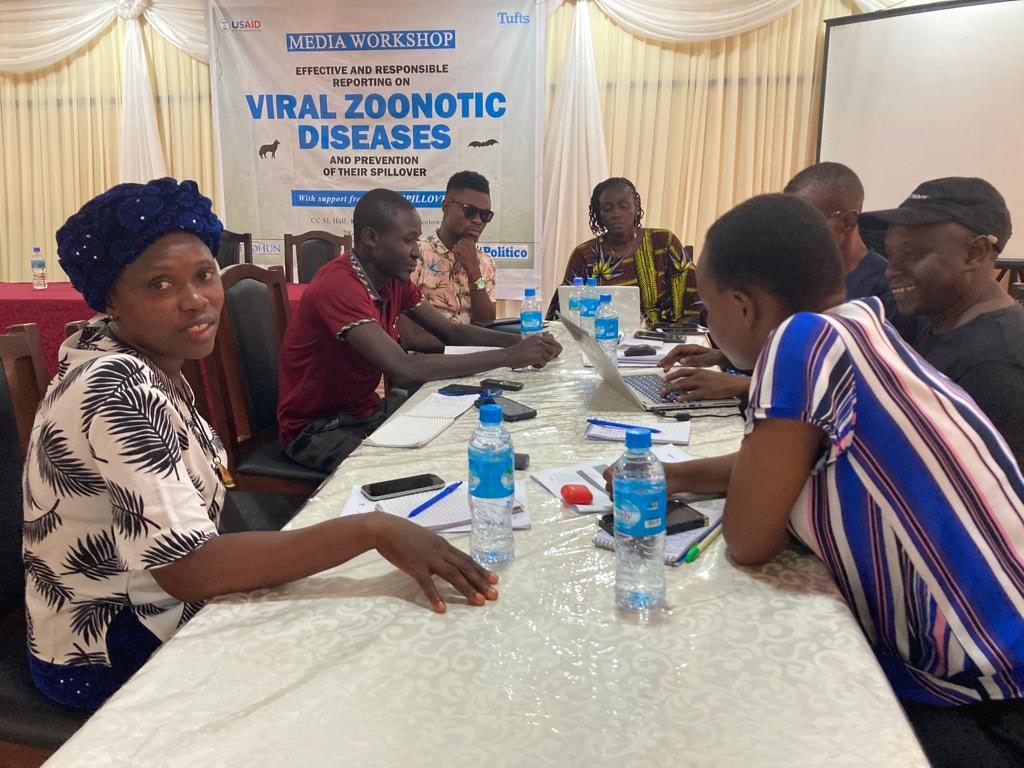By Shadrach Aziz Kamara
The Free Media Group (FMG), publishers of the Politico newspaper, with support from STOP SPILLOVER, on Wednesday 30th August 2023, concluded three-day media Workshop for 50 journalists for effective and responsible reporting on Viral Zoonotic Diseases and prevention of their spillover.
The workshop started on the 28th of August and ended on the 30th of August 2023 at the CCSL Hall, King Harman Road, BrookFields, Freetown.
In his keynote address, a medical research scientist, Professor Aiah Gbakima, said that Zoonotic diseases are infections that are spread between people and animals, adding that they are responsible for most infectious diseases.
He continued that according to the US Center for Disease Control, Ebola, Lassa fever and COVID-19 outbreaks in Sierra Leone are clear indications of the dreadful nature of zoonotic diseases and that they should be given utmost care and attention in a bid to curtail their spread, and by extension, prevent the emergence of such new pathogens in the country and the world at large.
He furthered that the reason for the workshop is that journalists are often limited by factors such as the lack of information and accurate data, adding that the absence of expertise to interpret them, results in reports that are not informative enough and at times, also lack accuracy.
He pointed out that Politico, as the recipient of Internews’ media grant under the STOP SPILLOVER Project, decided to organize a three-day capacity-building training for local journalists to change this narrative.
He revealed that the training is aimed at building the capacity of journalists to report on zoonotic diseases and the threat of their spillover, with a One Health approach. According to Prof Gbakima, in these three days of training, journalists will learn from professionals and experts, among others, existing threats of zoonotic diseases such as Lassa Fever in Sierra Leone, the ongoing efforts to minimize these threats and minimize their impacts, and the way to report about these effectively and responsibly.
Professor Gbakima therefore admonished journalists to be culturally sensitive to reporting issues and that they should also ensure they investigate the story, devoid of politics, and should be fair in reporting and use simple language.
In his part, Dr. Edward Magbity, the Team Leader in Sierra Leone, updated the media on the Activities of the strategies to prevent spillover.
He maintained that STOP SPILLOVER is a consortium of several institutions working together to ensure that they prevent the Lassa fever, Ebola /filovirus in Sierra Leone, adding that their goal is to enhance understanding and reduce the risk of Zoonotic viral spillover amplification and spread.
He furthered that they are conducting research in communities such as the Gola Forest area because they are the potential frontline in Zoonotic spillover.
During a panel discussion, a journalist from India, Stella Paul, said that Journalists should not only focus on the story on one Gender alone, as it affects every gender (both male and female).
Journalists were taken on a conducted tour around the Sanctuary, as the workers carefully showed them the use of the different quarters where the chimps are placed, starting from the Nursery to the quarantine and the wildlife area.
In a PowerPoint presentation, one of the staff of Tacugama Sanctuary, Mr Alfred, said that each of the chimps has names, adding that they are sensitive in a way that each one of them knows their names as well as their foster mother, Mama P.
He revealed that 116 chimpanzees are presently in the sanctuary, and 33 are in quarantine.
He continued that they are quarantined because they want to train them to know their skills and prepare them to live freely, adding that they are also informed by the founder of the Sanctuary that there is encroachment in the Tacugama chimpanzee sanctuary, which is very dangerous.
One of the Facilitators, Dr Issac Massaquoi, the Media Trainer at the school of information and communications, and Kemo Cham, the Health Journalist, gave health reporting techniques and tips to the journalists that they should be aware of.
